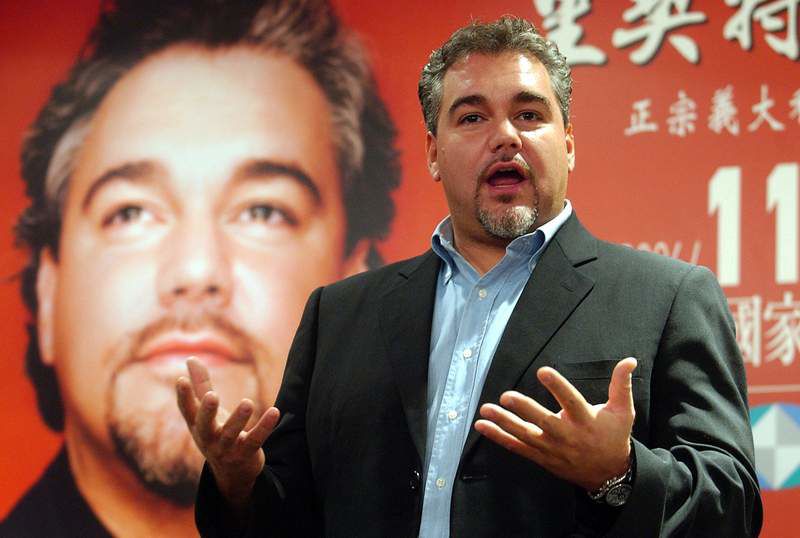Tenor Salvatore Licitra made a splashy debut at the Met
Published 5:00 am Tuesday, September 6, 2011

- Italian tenor singer Salvatore Licitra performs in Taipei, Taiwan, on Nov. 8, 2006. Licitra died in the Garibaldi Hospital in Catania, Sicily, on Monday morning without ever regaining consciousness after a motor scooter accident last month.
Salvatore Licitra, a tenor with a ringing, powerful voice who rode a sensational surprise Metropolitan Opera debut to dozens of performances with the company, died Monday in Catania, Sicily, nine days after being severely injured in a motor scooter accident. He was 43.
His death was reported on his website, salvatorelicitra.com.
News reports said that Licitra lost control of his scooter after suffering a cerebral hemorrhage on Aug. 27 near Ragusa, a town where he was to receive a prize Saturday, and suffered severe head injuries. He was not wearing a helmet, Reuters said, and was riding with his girlfriend, who was unhurt in the crash.
Chance of a lifetime
Licitra arrived on the New York scene with a splash in May 2002 to fill in at the Met for Luciano Pavarotti in two performances of Puccini’s “Tosca” that most believed would be Pavarotti’s farewell to the company. The second performance, on the final night of the Met season, was also simulcast to thousands sitting outside the house in the Josie Robertson Plaza at Lincoln Center.
Claiming illness, Pavarotti had canceled both performances, and Joseph Volpe, then the Met’s general manager, flew the Italian Licitra to New York on the Concorde as a last-minute substitute.
The first night’s audience, though geared up for a major Pavarotti event, nevertheless greeted Licitra with applause, and his big, warmly Italianate sound and full-voiced high notes — reminiscent of Pavarotti’s own — earned him cheers after his arias and an extended standing ovation.
In the following Met seasons, Licitra sang in Verdi’s “Forza del Destino” and “Un Ballo in Maschera,” Mascagni’s “Cavalleria Rusticana,” Leoncavallo’s “Pagliacci” and Puccini’s “Trittico” and “Turandot.” He was to appear in the title role of Verdi’s “Ernani” in February.
While retaining some of the raw power that was so impressive at his debut, Licitra was showing signs of increasing vocal strain in recent years. A New York Times review of his performance of “Turandot” last year found his voice “uneven, leathery and curiously cautious,” and worried about the fulfillment of his early promise.
Licitra’s recording career had also tapered off recently. Highlights were a pair of solo albums of mostly Italian opera standards, the last released in 2006, and an album of duets with the Argentine tenor Marcelo Alvarez. In 2000 he sang on the soundtrack of “The Man Who Cried,” a film starring Christina Ricci, Johnny Depp and Cate Blanchett.
Born to sing
Salvatore Licitra was born on Aug. 10, 1968, in Bern, Switzerland, to Sicilian parents. He grew up in Milan. At 18 he was working as a graphic artist for Italian Vogue when his mother, after hearing him sing along to the radio, urged him to take music lessons. He studied at the Music Academy of Parma and at the tenor Carlo Bergonzi’s voice academy in Busseto. After stints in several choirs, he began singing small operatic roles at regional houses.
As an understudy for the lead tenor role in “Un Ballo in Maschera” at the Verona Arena in 1998, he ended up replacing the star and singing the premiere. The performance was impressive enough to earn him an audition with Riccardo Muti, who was conducting a new production of “La Forza del Destino” at the Teatro Alla Scala in Milan. Muti cast him, in his company debut, as Don Alvaro.
Licitra also appeared at La Scala in “Tosca,” “Un Ballo in Maschera,” “Macbeth” and “Il Trovatore,” which, in 2000, began the company’s yearlong celebration of the centennial of Verdi’s death. For the “Trovatore” performances, Muti, a strict adherent to the letter of the score, forbade him to sing the traditional unwritten high C at the end of his aria “Di quella pira,” and the conductor was roundly booed for it.
Licitra sang the note six months later in Verona, to cheers.





